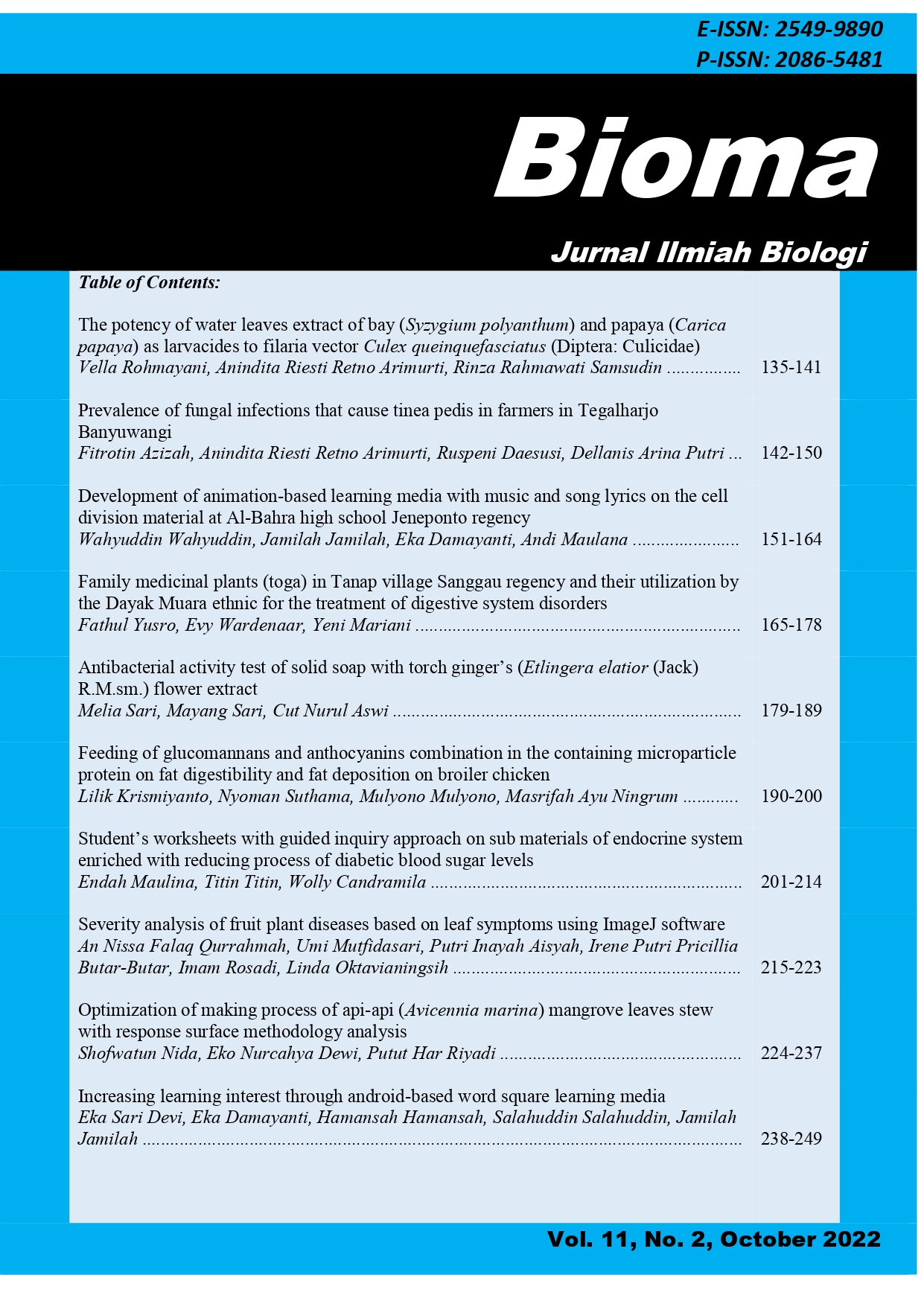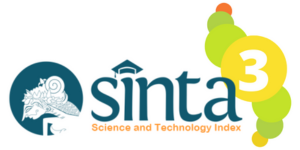IMPACT OF THE STUDENT FACILITATOR AND EXPLAINING MODEL INTEGRATED WITH SOCIO-SCIENTIFIC ISSUES ON ANALYTICAL THINKING SKILLS IN BIOLOGY EDUCATION
DOI:
https://doi.org/10.26877/sy0vtt35Keywords:
Biology learning, Analytical Thinking , Socioscientific Issue , Student Facilitator and ExplainingAbstract
The Merdeka Curriculum is designed to transform education by enhancing student engagement and preparing learners to face the complexities of the modern era. However, observations at SMA Negeri 9 revealed that students still struggle to connect information from various sources and show low participation in class discussions. This study aimed to examine the effect of the Student Facilitator and Explaining (SFE) model integrated with Socio-Scientific Issues (SSI) on students’ analytical thinking in biology learning.
The research used a quasi-experimental method with a non-randomized control group pretest-posttest design. Samples were selected using purposive sampling, consisting of an experimental class applying the SFE-SSI model and a control class using Problem-Based Learning (PBL). Data were collected through essay tests and observation sheets, and then analyzed using One-Way ANCOVA.
The results showed a significant effect of the learning model on analytical thinking [F(1,69) = 12.245, p < 0.001, ηp² = 0.151]. It is concluded that the SFE model integrated with SSI effectively enhances students’ analytical thinking in biology learning.
References
Afrilya, N., Afrianis, N., & Nurhadi. (2022). Pengaruh penerapan pendekatan Socio Scientific Issues terhadap kemampuan literasi sains siswa pada materi minyak bumi. Jurnal Riset Pendidikan Kimia (JRPK), 12 (1), 10–19. https://doi.org/10.21009/jrpk.121.02
Alpandi, Prihatiningtyas, N. C., & Husna, N. (2019). Pengaruh model pembelajaran Student Facilitator and Explaining (SFE) terhadap kemampuan berpikir kritis siswa pada materi Aljabar di SMP Negeri 13 Singkawang. Journal of Educational Review and Research, 2 (2), 101-111.
http://dx.doi.org/10.26737/jerr.v2i2.2004
Amin, & Sumendap, L. Y.S. (2022). 164 Model Pembelajaran Kontemporer. Pusat Penerbitan LPPM Universitas Islam 45 Bekasi.
Awalyah, T. I., Maghfiroh, D. N., & Rahman, I. F. (2024). Faktor-faktor yang menyebabkan rendahnya tingkat literasi di kalangan remaja. Cendikia : Jurnal Pendidikan dan Pengajaran, 2 (5), 329-335. https://doi.org/10.572349/cendikia.v2i5.1510
Ayeni, G. O., Idris, I. O., & Adebisi, Y. A. (2022). Addressing the social issues around vaccination could be the pivotal strategy to achieve the 2022 COVID-19 vaccination coverage target. In Annals of Medicine and Surgery (Vol. 80). Elsevier Ltd. https://doi.org/10.1016/j.amsu.2022.104299
Baehaqi, M. L. (2023). Penerapaan model Student Facilitator and Explaining (SFE) dalam pembelajaran PPKn kelas XI di SMA Negeri 11 Semarang. Waspada : Jurnal Wawasan Pengembangan Pendidikan, 11(1), 41-49.
https://doi.org/10.61689/waspada.v11i1.406
Darling-Hammond, L., Flook, L., Cook-Harvey, C., Barron, B., & Osher, D. (2020). Implications for educational practice of the science of learning and development. Applied Developmental Science, 24(2), 97–140. https://doi.org/10.1080/10888691.2018.1537791
Darwin, M., Mamondol, M. R., Sormin, S. A., Nurhayati, Y., Tambunan, H., Sylvia, D., Adnyana, M. D. M., Prasetiyo, B., Vianitati, P., & Gebang, A.A. (2021). Metode Penelitian Pendekatan Kuantitatif. CV Media Sains Indonesia.
Dewi, N. P., Rahmi, Y. L., Alberida, H., & Darussyamsu, R. (2020). Validitas dan reliabilitas instrumen penilaian kemampuan berpikir tingkat tinggi tentang materi Hereditas untuk peserta didik SMA/MA. JEP (Jurnal Eksakta Pendidikan), 4(2), 138-146. https://doi.org/10.24036/jep/vol4-iss2/512
Eka, I., Irawan, E., Ekapti, R. F., & Faizah, U. N. (2021). Efektivitas penerapan model pembelajaran Problem Based Learning terhadap peningkatan keterampilan berpikir analitis. Jurnal Tadris IPA Indonesia, 1 (2), 108-117. https://doi.org/10.21154/jtii.v1i2.142
Fadhilah, N., & Sabo’, H. (2021). Pengaruh model pembelajaran Student Facilitator and Explaining (SFAE) terhadap hasil belajar siswa pada materi Sistem Gerak pada Manusia kelas XI IPA MA Negeri Tana Toraja. Jurnal Riset dan Inovasi Pembelajaran, 1(2), 43–50. https://doi.org/10.51574/jrip.v1i2.28
Fatimah, S., Panjaitan, R. G. P., & Wahyuni, E. S. (2022). Penerapan model Student Facilitator and Explaining untuk meningkatkan hasil belajar dan respon siswa kelas XI SMA. JIPI (Jurnal IPA & Pembelajaran IPA), 6 (3), 300–309. https://doi.org/10.24815/jipi.v6i3.26866
Gumilar, G., Rosid, D. P. S., Sumardjoko, B., & Ghufron, A. (2023). Urgensi penggantian Kurikulum 2013 menjadi Kurikulum Merdeka. Jurnal Papeda : Jurnal Publikasi Pendidikan Dasar, 5(2), 148-155. https://e-journal.unimudasorong.ac.id/index.php/jurnalpendidikandasar/article/view/1825
Gustiani, & Aufa. (2023). Pengaruh model Student Facilitator and Explaining terhadap hasil belajar IPA materi sifat-sifat Magnet di Kelas 6 SD Al Washliyah 31 Pekan Labuhan. Attadib: Journal of Elementary Education, 7 (2). https://doi.org/10.32507/attadib.v7i2.1984.
Inayati, N. L., Fatimah, A. N., Azzahra, S. E., & Alamsyah, I. R. (2024). Implementasi tes essay dalam evaluasi pembelajaran Pendidikan Agama Islam. Khatulistiwa: Jurnal Pendidikan dan Sosial Humaniora, 4 (1), 114–120. https://doi.org/10.55606/khatulistiwa.v4i1.2724
Isa, A. H., Mahmud, Y. H., & Labodu, D. I. (2023). Student facilitator and explaining learning : its use to increase student learning outcomes. Journal of Research in Instructional, 3(2), 337–346. https://doi.org/10.30862/jri.v3i2.265
Jamaludin, G. M., & Marini, A. (2022). Model pembelajaran Student Facilitator and Explaining untuk meningkatkan hasil belajar IPA di Sekolah Dasar. Jurnal EDUCATIO, 8(4), 1483–1488. https://doi.org/10.31949/educatio.v8i4.3698
Laksono, R. K. S., Nurcahyo, H., & Wibowo, Y. (2023). Penerapan e-book berbasis socio-scientific issues dalam meningkatkan kemandirian belajar pada materi sistem sirkulasi darah. JINoP (Jurnal Inovasi Pembelajaran), 9(1). https://doi.org/10.22219/jinop.v9i1.22843
Lenaini, I. (2021). Teknik pengambilan Sampel Purposive dan Snowball Sampling. Jurnal Historis : Jurnal Kajian, Penelitian & Pengembangan Pendidikan Sejarah, 6 (1), 33 – 39.
https://doi.org/10.31764/historis.v6i1.4075
Mustikasari, I., Supandi, & Damayani, A. T. (2019). Pengaruh model Student Facilitator And Explaining (SFAE) terhadap kemampuan berpikir kritis. Jurnal Ilmiah Sekolah Dasar, 3(3), 303–309. https://doi.org/10.23887/jisd.v3i3.19455
Nasution, F., Siregar, Z., Siregar, R. A., & Manullang, A. Z. (2024). Pembelajaran dan Kontruktivis Sosial. MADANI : Jurnal Ilmiah Multidisiplin, 1 (12), 837–841. https://doi.org/10.5281/zenodo.10465606
Nurhalimah, S., Latip, A., & Purnamasari, S. (2024). Analisis pendekatan Socio-Scientific Issues (SSI) dalam Pembelajaran IPA terhadap Literasi Saintifik. Pendas : Jurnal Ilmiah Pendidikan Dasar, 9 (2). https://doi.org/10.23969/jp.v9i2.13540
Qamariyah, S. N., Rahayu, S., Fajaroh, F., & Alsulami, N. M. (2021). The Effect of Implementation of Inquiry-based Learning with Socio-scientific Issues on Students’ Higher-Order Thinking Skills. Journal of Science Learning, 4 (3), 210–218. https://doi.org/10.17509/jsl.v4i3.30863
Riadi, F. S., Yahya, R. N., Dewi, S. L., & Prihantini. (2022). Pengaruh model pembelajaran Student Facilitator and Explaining terhadap daya berpikir kritis siswa. Aulad : Journal on Early Childhood, 5(1), 56–60. https://doi.org/10.31004/aulad.v5i1.315
Riswakhyuningsih, T. (2022). Pengembangan Alur Tujuan Pembelajaran (ATP) mata pelajaran Ilmu Pengetahuan Alam (IPA) kelas VII SMP. RISTEK : Jurnal Riset, Inovasi, dan Teknologi Kabupaten Batang, 7 (1), 20-30. https://doi.org/10.55686/ristek.v7i1.123
Sari, D. R., Saputro, S., & Sajidan. (2025). A systematic review on integrating SSI into science education : its impact on 21st century skills (2014-2024). Educational Studies and Research Journal (ESRJ), 2(1), 1-14. https://doi.org/10.5281/zenodo.14693973
Sadler, T. D., Foulk, J. A., & Friedrichsen, P. J. (2016). Evolution of a Model for Socio-Scientific Issue Teaching and Learning. International Journal of Education in Mathematics, Science and Technology, 5(1), 75. https://doi.org/10.18404/ijemst.55999
Sahir, S.H. (2021). Metodologi Penelitian. Yogyakarta : Penerbit KBM Indonesia.
Saifuddin, A. (2015) Penerapan model pembelajaran Student Facilitator and Explaining (SFE) dengan menggunakan peta konsep untuk meningkatkan keaktifan dan prestasi belajar siswa pada mata pelajaran ekonomi kelas X lintas minat ekonomi di SMA Negeri 02 Batu. Diploma thesis, Universitas Negeri Malang.
Saputro, A. D., Atun, S., Wilujeng, I., Ariyanto, A., & Arifin, S. (2020). Enhancing pre-service elementary teachers’ self-efficacy and critical thinking using problem-based learning. European Journal of Educational Research, 9(2), 765–773. https://doi.org/10.12973/eu-jer.9.2.765.
Sarwiningsih, R. (2017). The comparison accuracy estimation of test reliability coefficients for national chemistry examination in Jambi Province on academic year 2014/2015. JKPK (Jurnal Kimia dan Pendidikan Kimia), 2(1). https://doi.org/10.20961/jkpk.v2i1.8740
Tamsil, R. K., Sirih, M., & Sabilu, M. (2022). Penerapan model pembelajaran Student Facilitator and Explaining dalam meningkatkan pengetahuan konseptual materi Sistem Gerak SMAN 1 Lapandewa. AMPIBI : Jurnal Alumni Pendidikan Biologi, 6(4). https://doi.org/10.36709/ampibi.v6i4.23836
Utami, H. D., Yuniastuti, A., & Rudyatmi, E. (2018). Efektivitas model pembelajaran Problem Based Learning dengan Asesmen Portofolio pada materi Sistem Imun. Journal of Biology Education, 7(2), 202–208. https://doi.org/10.15294/jbe.v7i2.25518
Utomo, P. W., & Muna, I. A. (2024). Comparison effectiveness of e-booklets and videos based on SESD on students’ analytical thinking skills. JPBIO (Jurnal Pendidikan Biologi), 9(1), 74–84. https://doi.org/10.31932/jpbio.v9i1.3318
Widiyanto, J. (2018). Evaluasi Pembelajaran (sesuai dengan Kurikulum 2013). UNIPMA PRESS.
Wong, S., Ely, K., Weinschreider, E., Levy, J., Simanton, E., & Netski, D. (2025). Utilizing a Hybrid Faculty-Guided, Self-Directed Study Model to Teach Immunology to First-Year Medical Students. Medical Science Educator, 35(3), 1191–1194. https://doi.org/10.1007/s40670-025-02330-x
Zeidler, D. L. (2014). Socioscientific issues as a curriculum emphasis: Theory, research, and practice. Handbook of Research on Science Education, Volume II, 697–726. (D. L. Zeidler, Ed.).
Zeidler, D. L., Herman, B. C., & Sadler, T. D. (2019). New directions in socioscientific issues research. Disciplinary and Interdisciplinary Science Education Research, 1(1). https://doi.org/10.1186/s43031-019-0008-7.








